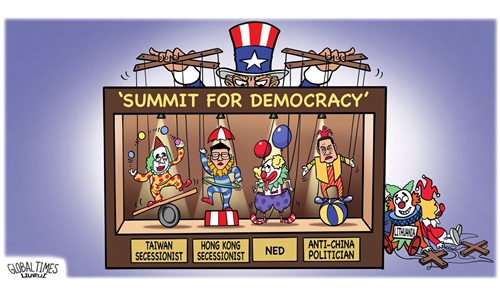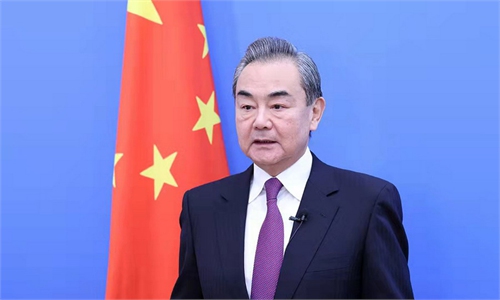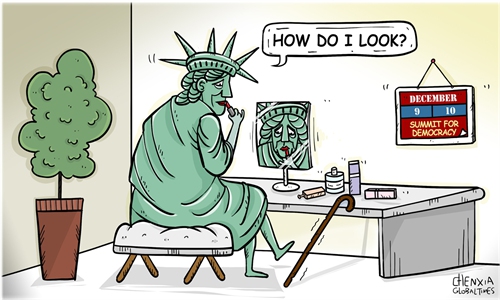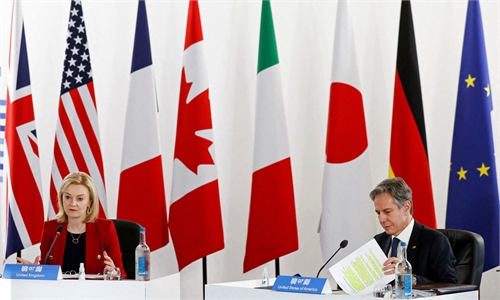GT Investigates: Western-style ‘democracy’ losing luster, with China’s political system performing better than US’ in the eyes of the nation’s youth
GT survey shows young people no longer buying Western definition of ‘democracy’
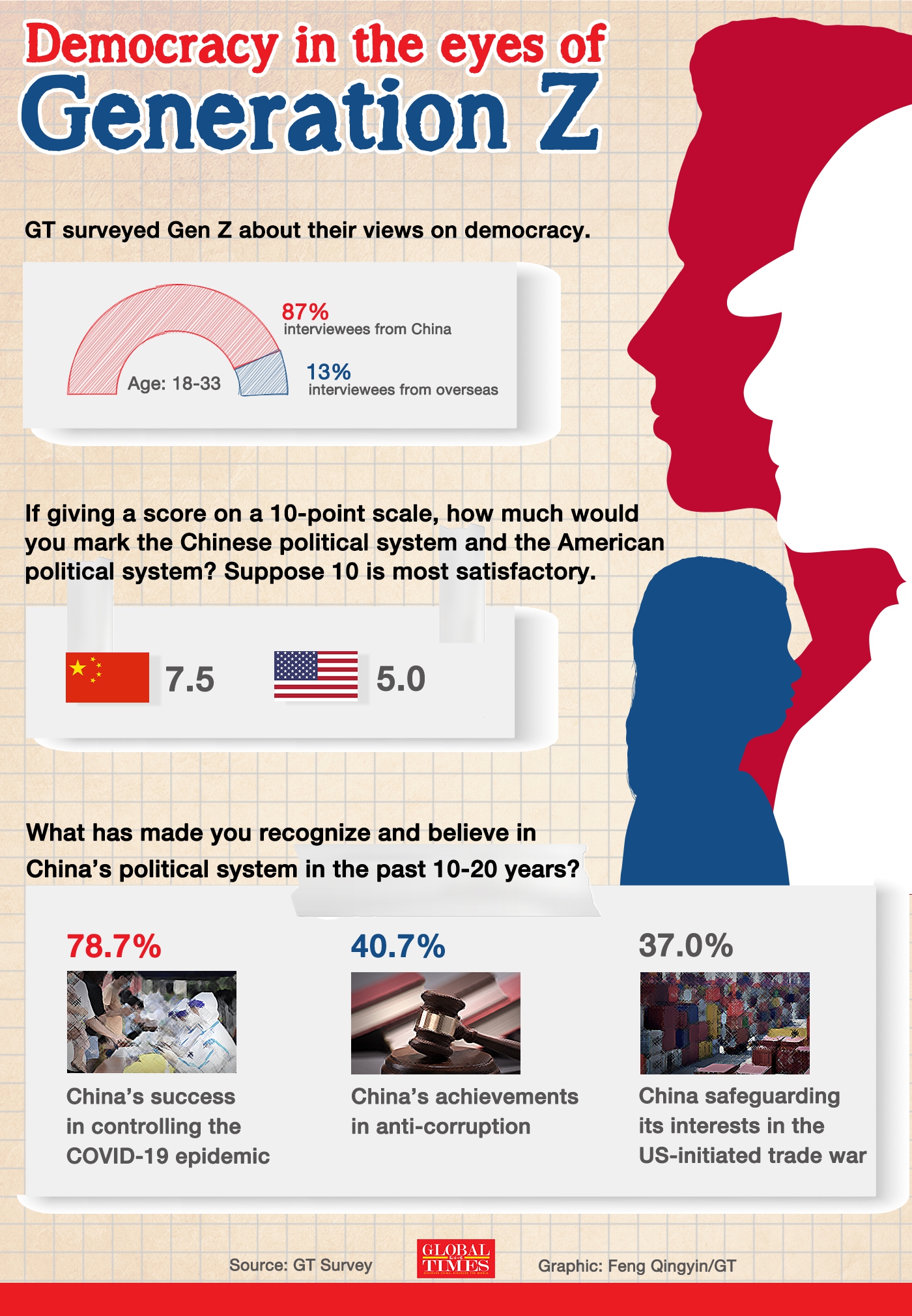
Democracy in the eyes of Generation Z. Graphic:Feng Qingyin/GT
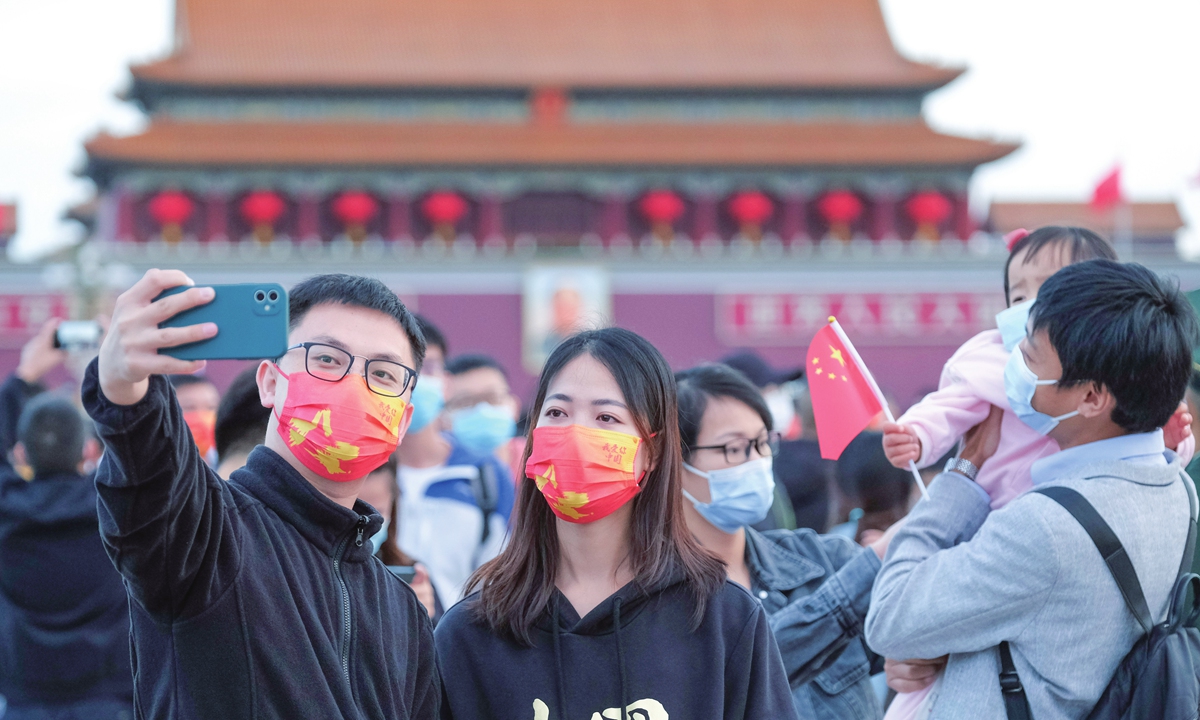
Two young people take a selfie at Tiananmen Square on the morning of October 1, 2021 after the flag-raising ceremony. More than 130,000 people came to the square to celebrate the 72nd anniversary of the founding of the People's Republic of China on the day. Photo: VCG
A recent questionnaire survey conducted by the Global Times found that most Chinese young people, especially Generation Z born in the 1990s and 2000s, now view China as more democratic than the US and Western political systems, which are no longer considered a "role model" of democracy, while Washington held a "summit for democracy" in a vain attempt to keep hold of its monopoly in defining "democracy."
The survey includes 10 questions about the view of China's Generation Z on democracy and the comparison between the Chinese political system and US political system's performance in realizing democracy for the peoples of the two countries. The survey finds that most participants, who used to believe in Western democracy (including a multi-party system, 'one person one vote' and a tripartite structure) is "the only correct answer of democracy for the world," have no longer held this view.
Young Chinese people have started to approve of China's political system more than the US "democratic" system, as many major events and incidents over past decades, including the COVID-19 pandemic, the chaos of US presidential election 2020-21, the US-initiated trade war against China, the immigrant crisis in Europe, Brexit, the Global War on Terror, and the turmoil in Hong Kong during 2019, have led to profound changes in their attitudes, according to survey results.
When scoring, from 1 to 10, China and the US in comparing "which country's political system is better," the interviewees, on average, gave China a score of 7.5 while the US received a 5. The survey found that 97.2 percent of young Chinese believe that the US' "summit for democracy" is unable to save "US or Western democracy" from the current crisis.
The survey, conducted from November 29 to December 8, included 108 interviewees aged 18-33, who are students from universities across the country and also many top universities in developed Western countries including the US, the UK and Canada. The survey covered young people who work in industries including finance, energy, transportation, education, trade, IT, medical and health, food, video game development, media, as well as those who serve in the governmental departments and state-owned enterprises.
The survey not only sought out interviewees in economically developed first-tier cities like Beijing and Shanghai, and cities like Guangzhou and Shenzhen in Guangdong Province, and adjacent Hong Kong, but also includes those in other provinces and border regions including Zhejiang, Anhui, Henan, Hunan, Hubei, Sichuan, Shanxi, Shaanxi, Fujian, Jilin, Liaoning, Heilongjiang, Inner Mongolia and Xinjiang.
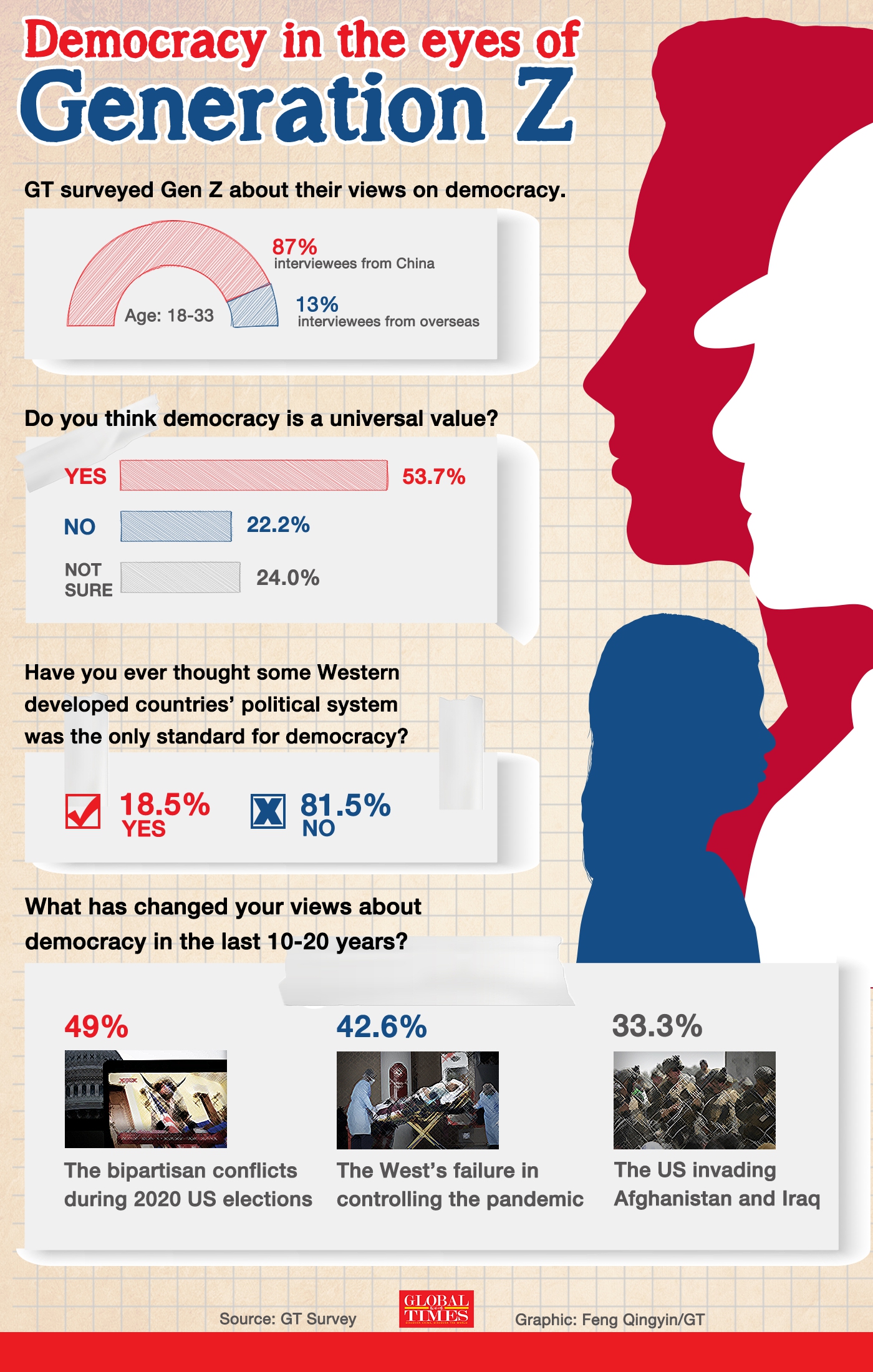
Democracy in the eyes of Generation Z. Graphic:Feng Qingyin/GT
What is democracy?
The survey results revealed that most interviewees (53.7 percent) confirm that "Yes, democracy is a shared value of humanity" with a minority answering either "No" (22.2 percent) or "Not sure" (24 percent).
Some of those who answered "No" and "Not sure" in the questionnaire told the Global Times that long-standing perceptions about "democracy" from the West and those "public intellectuals" in China who seek to undermine China's political system and dilute patriotism among the Chinese people by exaggerating and idealizing the Western political system, have made them feel "disgusted" when contemplating the term "democracy."
"Many developing countries in Southeast Asia, Africa, Middle East and Latin America, which follow the Western paradigm on 'democracy,' are still suffering from endless chaos and have failed to achieve the development they wanted through endless regime changes and useless elections, so I don't think 'democracy' should be a shared value of humanity," said an interviewee from a Beijing-based company aged 24 who asked not to be named.
However, here comes a question. "Which 'democracy' are we talking about? The first one is the value of democracy that is truly shared by the international community, including China; the second one is the Western political system; the third one is the so-called universal values that Western countries force other countries to follow but which have led to endless chaos, poverty and conflict across the globe. They are totally different," Shen Yi, a professor from the School of International Relations and Public Affairs at Fudan University, told Global Times.
Another interviewee surnamed Liu, 28, from Anhui Province, said "if 'democracy' equals the Western political system, then I disagree that it should be the value shared by humanity. In Chinese, the word democracy, Min Zhu, consists of two characters - the people and ruling or master. So, if you ask me is the people should be the masters of their country' a shared value of humanity, then I would say 'yes'."
Analysts said the survey results show that the term "democracy" has been defiled by the West, especially the US, since Western countries always use their monopoly in defining the term to lecture others, to interfere with non-Western countries' internal affairs, and even to create pretexts for military interventions, legitimizing their invasion of many non-Western countries.
As a result, some young Chinese have confused "democracy as the shared value of humanity" with "the term used by Western countries and Western mainstream media outlets frequently in lecturing the rest of the world," experts noted, stressing that there are many approaches to reach the goal of democracy, or to let the people truly rule their country and to make sure a government truly serves the interests of its people, and the Western political system is just one of many approaches, now many facts are suggesting this approach is not very effective and is quickly losing credibility across the globe, including in the US.
When it comes to the definition of "democracy," none of the 108 surveyed consider the Western standard should be the universal definition, with 100 of them agreeing that "every nation and civilization should have its own democratic system based on its own national conditions and culture. As long as the people are the real masters of the country, the social system is supporting the interests of the people, the power of the government is under effective supervision and the power transition of the national leaders based on the law can be realized in order, then the approaches or models for democracy could be diversified, and there should not be only one standard for 'democracy'."
The remaining eight believe China's "Whole-Process People's Democracy" is much more relevant than Western democracy in defining "democracy."
The survey showed that 76 (70.3 percent) of the interviewees believe that "China and the Western political systems have their own advantages and disadvantages, so it's hard to say which is better, and both sides should keep learning from each other, rather than attack and disparage each other. They should remain relevant to peoples' lives and engage in continued reform to better serve the public."
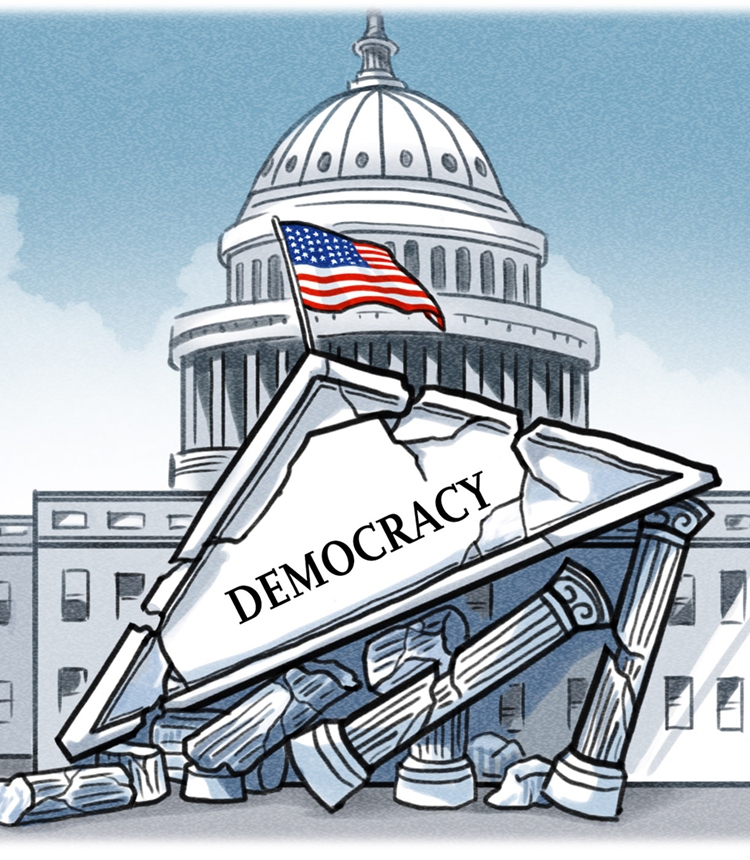
Crumbling US democracy. Illustration: Liu Rui/GT
Zhang Weiwei, director of the China Institute of Fudan University in Shanghai, told the Global Times, "If many countries, and people in the world, prefer the Western model [of democracy], [and if] Americans prefer the American model, then we respect your choice, but we do not envy you. To be honest…we have some sympathy for you. You have to improve, otherwise, without reform, it [the Western or American model for democracy] will get worse and worse."
A participant in the survey, who is 29 years old and lives in Urumqi,Northwest China's Xinjiang Uygur Autonomous Region, told the Global Times why there is not an option for "zero" for scoring US democracy. The US has unveiled all its hypocrisy in recent years by hyping all kinds of lies on the Xinjiang region.
"I don't think the US has any right to say anything about 'democracy' or 'human rights' given its previous slaughter of Native Americans and the current blatant smearing of Xinjiang," said the young man.
The survey also finds that some young people from economically developed regions and overseas are more open-minded and neutral when comparing China's and the West's systems, while those from developing border regions like Xinjiang are more assertive in criticizing US or Western democracy and more supportive and thankful for China's political system and democracy.
Changing minds
Among the 108 interviewees, 20 used to believe in the Western political system - one built on characteristics including a multi-party or two-party system, "one person one vote" and a tripartite structure to separate powers between the legislature, executive and judiciary - is "the only correct answer and standard for democracy" and "the whole world should learn from the West and flow the West on the matter of democracy."
Only one interviewee among the 20 still maintains this view, and the other 19 have all changed their "view of democracy," according to the survey results.
"In the past decades, what critical issues in the international arena have led you to change your view of democracy? Please provide three examples." On this question, the following three issues were most prevalent: First, the chaos of the 2020-21 US presidential election, which includes the death of George Floyd, the storming of US Capitol Hill and former US president Donald Trump being banned from all US mainstream social media platforms (49 percent).
Second, the poor performance of Western countries in handling the COVID-19 pandemic which has led to a huge number of deaths, and the US recklessly blaming China, as well as an unfair vaccine allocation policy (42.6 percent), and third, the US-launched Global War on Terror that has caused destructive wars and a huge number of civilian casualties in Iraq and Afghanistan over the past 20 years (33.3 percent).
Some interviewees provided their own answers about the question, such as the Ukraine crisis, the tragedies which occurred after the "Arab Spring," Brexit, the rise of Trumpism in the US, and the immigrant crisis in Europe.
"After watching the British TV series Yes, Prime Minster, I found Western democracy is truly unreliable and hilarious. We should never choose it for governing our own country," said Su Muzhe, 22, an interviewee from North China's Shanxi Province.
Away from focusing on critical issues occurring abroad, another survey question asked that, "What critical issues that happened in China over the past one or two decades have changed your view of 'democracy'? Please provide three examples." In other words, how has China won your approval over the West?
Most interviewees nominated China's successful handling over the COVID-19 epidemic (78.7 percent), which was strong proof of the efficiency of the Chinese system and showed that the Communist Party of China's (CPC) prioritizes people's lives and interests, as always.
Across the surveyed group, 44 of the 108 interviewees (40.7 percent) picked "the CPC's long-standing and effective anti-corruption campaign following the 18th National Congress of the CPC." Several interviewees reflected that the campaign addressed the long-existing corruption problem and witnessed the CPC's determination to eliminate corruption permanently. The political environment in China has improved greatly following this campaign, many noted.
A total of 40 (37 percent) interviewees picked China's determined response to the US-initiated trade war against China over recent years, as this proves that the CPC will not compromise when it comes to bullies and is able to protect the country's national interests, especially China's right to seek out its own development pathway. It also proved that China is a country which is capable of saying "No" to the only superpower in the world, while many other countries are unable to resist US intimidation.
An interviewee surnamed Lan, from Southwest China's Sichuan Province, said that "the post-disaster rescue and reconstruction of Wenchuan after the 512 Earthquake in 2008 is also a significant example. This has greatly strengthened our support and approval for the CPC, especially for the people in Sichuan. We found the system of our country is able to unify and organize forces across the country to come to save and aid people during a disaster or crisis. We truly appreciate this." Wenchuan, a county located in the northwest of Sichuan, was devastated on May 12, 2008 by an earthquake of 8.0 on the Richter magnitude, causing the tragic death of 69,227 people and injuring much more.
Some other interviewees also said the turmoil in Hong Kong in 2019 has also changed their view on democracy, because they found without order and strong law-enforcement, hostile foreign forces and internal secessionists working with anti-government forces would have chance to inflict serious damage on the country's stability and national security. They said they saw the strength of the socialist system in the mainland following the central government's handling of the violent unrest in Hong Kong.
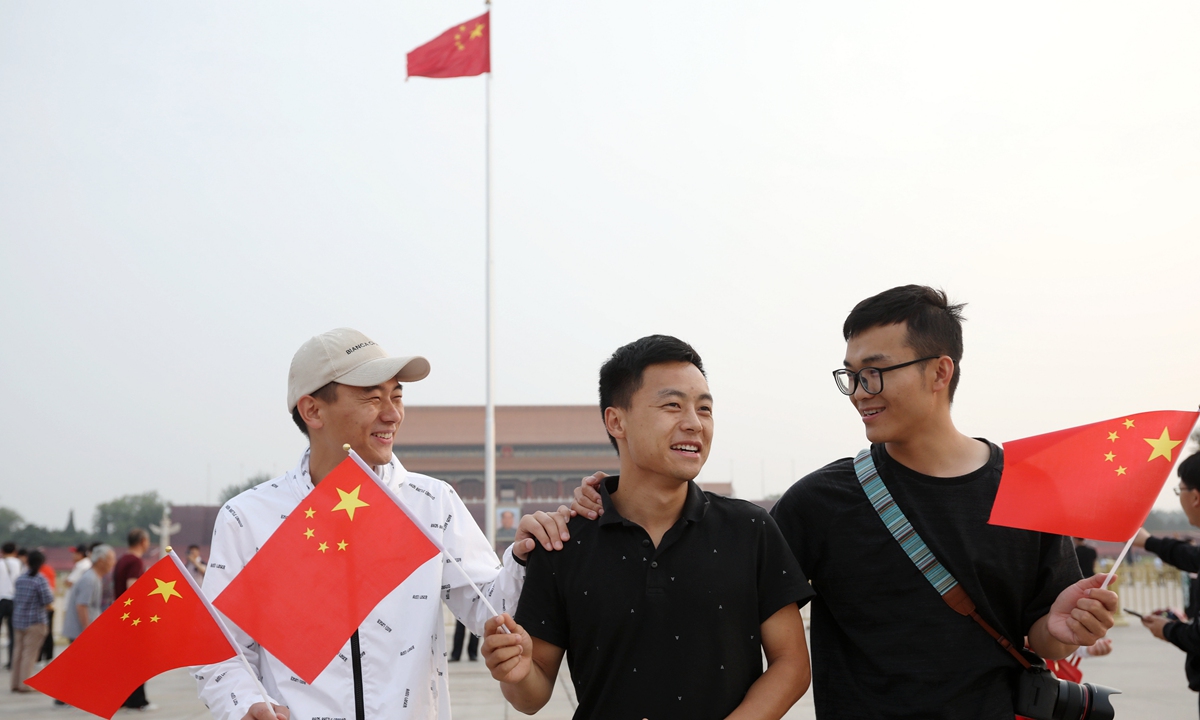
Three men hold Chinese national flags at Tiananmen Square in Beijing after the flag-raising ceremony. Photo: Cui Meng/GT
Lü Xiang, a research fellow from the Chinese Academy of Social Sciences, told the Global Times that "Chinese Generation Z, over the last one or two decades which covers their childhood and adolescence, have witnessed the most successful period of the development of the socialism with Chinese characteristics. And they have also witnessed the increasing failure and chaos across the Western world. They represent the most confident generation of the Chinese people and they cannot be fooled by Western propaganda when it comes to 'democracy'."If the US honestly admits its mistakes and shows its determination to implement the much-needed reform, and offers praise to other non-Western countries like China when other countries have outperformed the US, like with the fight against COVID-19, instead of maintaining a posture of arrogance and insistence on being right every time, then the US would still have hope to make its 'democracy' more popular among Chinese youth again," he noted.




